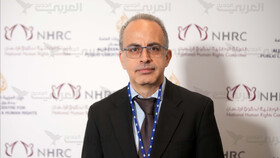A meeting of the UN Security Council Counter-Terrorism Committee in India has ended with the adoption of a document committing Member States to prevent and combat digital forms of terror, notably using drones, social media, and online terrorist financing.
The non-binding document, known as The Delhi Declaration on countering the use of new and emerging technologies for terrorist purposes was adopted in the Indian capital on Saturday, following a series of panels that involved Member States representatives, UN officials, civil society entities, the private sector, and researchers.
The declaration aims to cover the main concerns surrounding the abuse of drones, social media platforms, and crowdfunding, and create guidelines that will help to tackle the growing issue.
“The Delhi declaration lays out the foundation for the way ahead,” said David Scharia from the Counter-Terrorism Executive Committee. “It speaks about the importance of human rights, public-private partnership, civil society engagement, and how we are going to work together on this challenge. It also invites the CTED [the Secretariat for the Committee] to develop a set of guiding principles, which will result from intensive thinking with all the partners.”
Respect for human rights was highly stressed in the document, and during the debates. The UN Secretary-General, António Guterres, underscored that there must be “concrete measures to reduce these vulnerabilities while committing to protect all human rights in the digital sphere.”
In a video message, Mr. Guterres added that human rights could only be achieved through effective multilateralism and international cooperation, with responses that are anchored in the values and obligations of the United Nations Charter and the Universal Declaration of Human Rights.
Representing the Human Rights Office, Scott Campbell, who leads the digital technology team, echoed the Secretary-General, explaining that “respecting rights when countering terrorism is fundamental to ensuring sustainable and effective efforts to protect our security.”
“Approaches that cross these important lines not only violate the law, but they also undermine efforts to combat terrorism by eroding the trust, networks, and community that is essential to successful prevention and response,” he said.
Mr. Campbell argued that international law and human rights present many answers to the issue, recalling that the Member States have a duty to protect the security of their population and to ensure that their conduct does not violate the rights of any person.
He also stressed that companies and States should be cautious when filtering and blocking social media content, as it can “affect minorities and journalists in disproportionate ways.”
To overcome the issue, Mr. Campbell suggested that restrictions should be based on precise and narrowly tailored laws, and should not incentivize the censoring of legitimate expression. He argued that they should have transparent processes, genuinely independent and impartial oversight bodies, and that civil society and experts should be involved in developing, evaluating, and implementing regulations.
During the closing session of the meeting, the Committee chairperson, Ambassador Ruchira Kamboj of India, stated that the outcome document takes note of the challenges, and proposes “practical, operational, and tactical possibilities of addressing the opportunities and the threats posed by the use of new and emerging technologies for terrorist purposes.”
She added that the global policymaking community “must be agile, forward-thinking, and collaborative” to meet the changing needs of States facing new challenges from digital terror.
Delhi Declaration highlights:
- In the Delhi Declaration, Member States agree that guidelines and implemented actions should be based on international law and human rights.
- Members of the Committee will draft recommendations to counter the terrorist exploitation of Information and Communications Technology, such as payment technologies and fundraising methods and misuse of unmanned aerial systems (UAS, or drones).
- The body will assist Member States in the implementation of all relevant Security Council resolutions to countering the use of technologies for terrorist purposes, while respecting human rights and fundamental freedoms.
- A new set of non-binding guiding principles to assist Member States in countering the digital terrorism threat will be issued, with a compilation of good practices on the opportunities offered by the same set of technologies to tackle threats.
The relevant offices will commit to deepening engagement and cooperation with civil society, including women and women’s organizations, relevant private-sector entities, and other stakeholders, and build partnerships.





